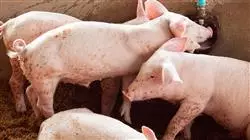University certificate
The world's largest faculty of nutrition”
Introduction to the Program
Join the elite with this highly effective educational program and open new paths to your professional progress”

This Postgraduate certificate determines the process that must be followed in the manufacture of balanced feed to design, elaborate and evaluate the manufacture of the same for animals, from the design of the formula (diet) to the different points to be evaluated to determine the quality, safety and performance of a finished feed for animals.
During its development, a theoretical-practical and specialized knowledge is approached in order to achieve a product that complies with the specifications in the paper and that has all the quality and innocuousness that allows to reach the desired benefit in the animals that consume it.
A high-value Postgraduate certificate designed for professionals to update and perfect their technical and practical knowledge in this sector. A complete and effective Postgraduate Certificate that will propel them to the highest level of competence.
An ambitious, broad, structured and intertwined proposal, which covers from the fundamental and relevant principles of nutrition, to the manufacture of food. All this with the characteristics of a Postgraduate certificate of high scientific teaching and technological level.
A course that will enable you to work in Animal Nutrition and Feeding with the solvency of a high-level professional"
This Postgraduate certificate in Balanced Feed Manufacturing: Processes, Quality Control and Critical Points contains the most complete and up-to-date scientific program on the market. The most important features include:
- The latest technology in online teaching software
- Intensely visual teaching system, supported by graphic and schematic contents, easy to assimilate and understand
- Practical cases presented by practising experts
- State-of-the-art interactive video systems
- Teaching supported by telepractice
- Continuous updating and recycling systems
- Autonomous learning: full compatibility with other occupations
- Practical exercises for self-assessment and learning verification
- Support groups and educational synergies: questions to the expert, debate and knowledge forums
- Communication with the teacher and individual reflection work
- Content that is accessible from any fixed or portable device with an Internet connection
- Supplementary documentation databases are permanently available, even after the course
Become one of the most demanded professionals of the moment: educate yourself with our Course in Balanced Feed Manufacturing: Processes, Quality Control and Critical Points"
TECH's teaching staff is made up of professionals from different fields related to this specialty. This ensures that they are provided with the targeted training upgrade objective. A multidisciplinary team of professionals prepared and experienced in different environments, who will cover the theoretical knowledge in an efficient way, but, above all, will bring the practical knowledge from their own experience to the program: one of the differential qualities of this program.
This mastery of the subject is complemented by the effectiveness of the methodological design of this Postgraduate certificate. Developed by a multidisciplinary team of e-learning experts, it integrates the latest advances in educational technology. In this way, our students will be able to study with a range of convenient and versatile multimedia tools that will give them the operability they need during the program.
The design of this program is based on Problem-Based Learning: an approach that conceives learning as a highly practical process. To achieve this remotely, telepractice will be used: with the help of an innovative system of interactive videos, and Learning from an Expert you will be able to acquire the knowledge as if you were facing the case you are learning in real time. A concept that will allow students to integrate and memorize what they have learnt in a more realistic and permanent way.
You will be able to download all the content to any electronic device from the Virtual Campus and consult it whenever you need it, even without an Internet connection"

Access now to a library full of high quality multimedia content"
Why study at TECH?
TECH is the world’s largest online university. With an impressive catalog of more than 14,000 university programs available in 11 languages, it is positioned as a leader in employability, with a 99% job placement rate. In addition, it relies on an enormous faculty of more than 6,000 professors of the highest international renown.

Study at the world's largest online university and guarantee your professional success. The future starts at TECH”
The world’s best online university according to FORBES
The prestigious Forbes magazine, specialized in business and finance, has highlighted TECH as “the world's best online university” This is what they have recently stated in an article in their digital edition in which they echo the success story of this institution, “thanks to the academic offer it provides, the selection of its teaching staff, and an innovative learning method aimed at educating the professionals of the future”
A revolutionary study method, a cutting-edge faculty and a practical focus: the key to TECH's success.
The most complete study plans on the university scene
TECH offers the most complete study plans on the university scene, with syllabuses that cover fundamental concepts and, at the same time, the main scientific advances in their specific scientific areas. In addition, these programs are continuously being updated to guarantee students the academic vanguard and the most in-demand professional skills. In this way, the university's qualifications provide its graduates with a significant advantage to propel their careers to success.
TECH offers the most comprehensive and intensive study plans on the current university scene.
A world-class teaching staff
TECH's teaching staff is made up of more than 6,000 professors with the highest international recognition. Professors, researchers and top executives of multinational companies, including Isaiah Covington, performance coach of the Boston Celtics; Magda Romanska, principal investigator at Harvard MetaLAB; Ignacio Wistumba, chairman of the department of translational molecular pathology at MD Anderson Cancer Center; and D.W. Pine, creative director of TIME magazine, among others.
Internationally renowned experts, specialized in different branches of Health, Technology, Communication and Business, form part of the TECH faculty.
A unique learning method
TECH is the first university to use Relearning in all its programs. It is the best online learning methodology, accredited with international teaching quality certifications, provided by prestigious educational agencies. In addition, this disruptive educational model is complemented with the “Case Method”, thereby setting up a unique online teaching strategy. Innovative teaching resources are also implemented, including detailed videos, infographics and interactive summaries.
TECH combines Relearning and the Case Method in all its university programs to guarantee excellent theoretical and practical learning, studying whenever and wherever you want.
The world's largest online university
TECH is the world’s largest online university. We are the largest educational institution, with the best and widest online educational catalog, one hundred percent online and covering the vast majority of areas of knowledge. We offer a large selection of our own degrees and accredited online undergraduate and postgraduate degrees. In total, more than 14,000 university degrees, in eleven different languages, make us the largest educational largest in the world.
TECH has the world's most extensive catalog of academic and official programs, available in more than 11 languages.
Google Premier Partner
The American technology giant has awarded TECH the Google Google Premier Partner badge. This award, which is only available to 3% of the world's companies, highlights the efficient, flexible and tailored experience that this university provides to students. The recognition as a Google Premier Partner not only accredits the maximum rigor, performance and investment in TECH's digital infrastructures, but also places this university as one of the world's leading technology companies.
Google has positioned TECH in the top 3% of the world's most important technology companies by awarding it its Google Premier Partner badge.
The official online university of the NBA
TECH is the official online university of the NBA. Thanks to our agreement with the biggest league in basketball, we offer our students exclusive university programs, as well as a wide variety of educational resources focused on the business of the league and other areas of the sports industry. Each program is made up of a uniquely designed syllabus and features exceptional guest hosts: professionals with a distinguished sports background who will offer their expertise on the most relevant topics.
TECH has been selected by the NBA, the world's top basketball league, as its official online university.
The top-rated university by its students
Students have positioned TECH as the world's top-rated university on the main review websites, with a highest rating of 4.9 out of 5, obtained from more than 1,000 reviews. These results consolidate TECH as the benchmark university institution at an international level, reflecting the excellence and positive impact of its educational model.” reflecting the excellence and positive impact of its educational model.”
TECH is the world’s top-rated university by its students.
Leaders in employability
TECH has managed to become the leading university in employability. 99% of its students obtain jobs in the academic field they have studied, within one year of completing any of the university's programs. A similar number achieve immediate career enhancement. All this thanks to a study methodology that bases its effectiveness on the acquisition of practical skills, which are absolutely necessary for professional development.
99% of TECH graduates find a job within a year of completing their studies.
Postgraduate Certificate in Manufacture of Balanced Food: Processes, Quality Control and Critical Points
The rise of breeding practices developed in the production of proteins and its close relationship with correct animal nutrition have made of the elaboration and manufacture of balanced food, one of the most important sectors of veterinary medicine in recent times. This situation has been evidenced in the exponential growth of labor demand for professionals specialized in the field. Understanding the direct relationship of the growth of this occupational field with the increase in the need for academic updating in the area, at TECH Global University we have designed a Postgraduate Certificate in Manufacture of Balanced Food, Processes, Quality Control and Critical Points, focused on the professional training. In this postgraduate Postgraduate Certificate, special attention will be paid to the new machines and equipment recently implemented in the feed industry. In addition, it delves into the identification of the different types of mixers used in the manufacture of food; followed by knowledge of the importance of the grinding process and the effects of particle size on the zootechnical performance of pigs and poultry.
Study an online Postgraduate Certificate on the manufacture of balanced feed
The correct control of the various factors that influence the quality of animal feed manufacturing processes highlights this veterinary sector as an area that requires the presence of professionals with a high degree of preparation. In our program you will address the knowledge of the new trends and processes that determine the patterns of future development of the balanced food manufacturing sector. In addition, you will study the identification of the different types of storage used for cereals and raw materials; followed by the new programs and protocols used in the quality control of modern balanced feed manufacturing processes.







